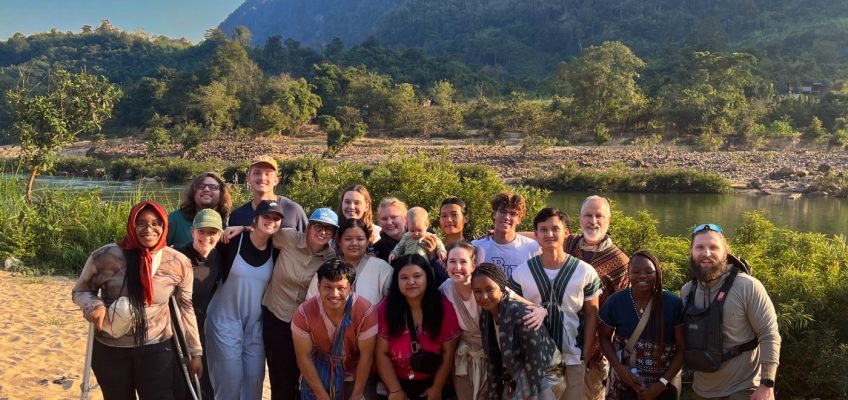Several K’nyaw students visited Thailand as part of a Bethel University class in January. It was the first time many returned to the country since immigrating to the United States as children.
Led by professor Ripley Smith and Jesse Phenow, 18 students spent 24 days in the country visiting local students, staying with host families, meeting community leaders and learning more about the K’nyaw people, the diaspora and conflict in Myanmar.
Five of those students at the Arden Hills private school are K’nyaw, often known as the Karen. With their families, they had immigrated to the U.S. after leaving refugee camps.
K’nyaw people in Thailand
More than 3 million people in Myanmar, formerly known as Burma, have been displaced in the country’s four-year civil war since a military coup seized power from the elected government in 2021, according to the Associated Press.
Thailand hosts more than 100,000 refugees from Myanmar in nine temporary shelters along its western border with Myanmar. Around 80% of camp residents are from the Karen ethnic minority.
“There are numerous ethnic minority groups within Burma that have been persecuted. The K’nyaw have been maybe the longest that have suffered the persecution because the Burmese government after World War II saw them as a particular threat because of their close relationship with the British when the British left,” Smith said.
More than 20,000 Karen people live in the state, making it the largest community of the ethnic group in the U.S., according to the Karen Organization of Minnesota, a social services agency for refugees.
Meeting family, community leaders
Students went to a number of cities — including Chiang Mai, Mae Sot and Bangkok. They visited refugee camps, met local students and learned more about the lives of refugees in Thailand. Sophomores Shem Paw and Htee Wah Moo were also able to meet family members still in Thailand.
The students also met with community leaders and organizations, such as Karen Environmental and Social Action Network, or KESAN, an Indigenous organization focusing on social and environmental issues.
“One of the ways the conflict has been perpetuated by the Burmese majority, the junta that’s in power, is to destroy the K’nyaw environment, because in Burma, they’re largely an agricultural economy, and so by destroying the environment, they destroy the villages and their lifestyle,” Smith said.
Not long after the visit by the students, USAID funding to Thailand, and other countries around the world, was cut off.
“The proximity to having just been there and having family there, and then when those cuts are made, it just makes it more real of the impact,” Smith said.
Reconnecting with their heritage
Besides learning about the work of community organizations and the K’nyaw people, students also had a chance for fun, from visiting local markets and an elephant sanctuary, to feeding water buffalo, to staying with host families.
“And they fed us homemade Karen food. It was so good, I ate so much,” Paw said.
It was the second year the trip was held, but it will not be offered in the next school year, according to Bethel University.
“For many, this was a profoundly meaningful opportunity to engage with the country’s culture and history — especially for students returning to their homeland and reconnecting with their heritage. The trip exemplified the transformational potential of global learning and reflected Bethel’s commitment to intercultural engagement rooted in Christ,” Virginija Wilcox, associate dean of international students and off-campus programs, said in a statement.
‘The shoes of my parents, my grandparents’
By the end, Paw didn’t want to leave, she said. Sophomore Nay Seya said he thinks the students’ sense of pride in their K’nyaw culture grew.
“Our parents talk about the oppression, the struggles, the hopes,” Seya said. “But for me, at least, I couldn’t really take in all the complexities of it. I could only sympathize with the problems. But then, once I went to Thailand, went to the camps, interacted, had cultural exchange with the students, and finally I got to embrace my culture. And then that sympathy became empathy, so I could finally put (myself) into the shoes of the students, into the shoes of my parents, my grandparents.”
Students Seya, Paw, Moo, Lulu Shwe and Kue Say all work on scholarship or do work-study at the Urban Village, a St. Paul nonprofit co-founded by Phenow that provides mentorship to Karen and Karenni youth.
“Going to Thailand was the perfect opportunity to embrace our culture and then come back and reconnect it with the youth here, especially in Minnesota,” Seya said.
Despite the conflict, many are not familiar with the K’nyaw people. But after meeting with community leaders and locals, such as Shee Lay, a Karen general, students also saw the impact and influence they can bring back home to the United States.
“For us, I think the one metaphor (the general) directly stated to us K’nyaw students was, our words reach way farther than his guns, which basically means, we have more of an … influence outside of the K’nyaw boundaries,” Seya said. “So like, over there, he can’t reach the K’nyaw people in foreign countries like the U.S. So it’s our jobs, or we’re obligated, to speaks about the despair, the oppression and the hopes of our people.”
Related Articles
U of M researchers are planting ‘survivor’ trees in hopes of defeating Dutch elm disease
Some states reexamine school discipline as Trump order paves go-ahead
Rapidly expanding school voucher programs pinch state budgets
Hill-Murray School breaks ground on $5.5M student union
Belgian princess left in doubt about her Harvard future following Trump’s foreign student ban


Leave a Reply